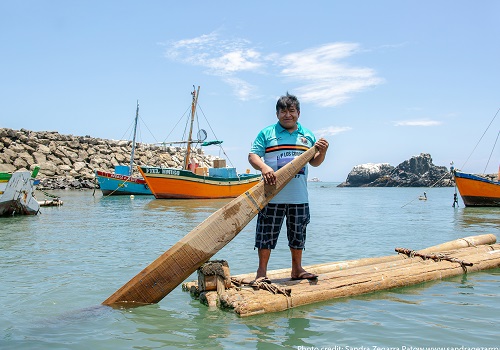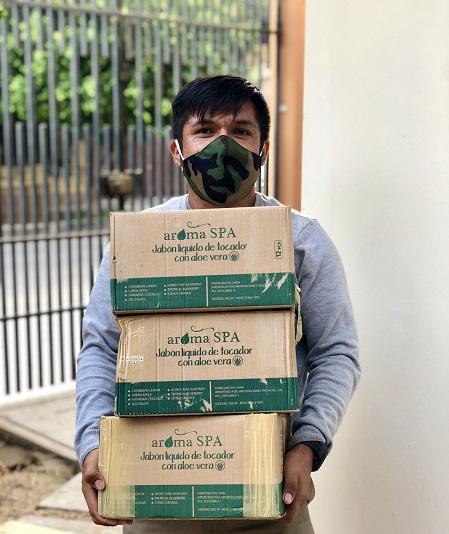Fishers are essential workers, but what happens when they don’t have the gear they need to work safely in a pandemic?
In Peru, small-scale fisheries play a critical role in food security, supplying approximately 95% of the seafood consumed domestically. But without personal protective equipment (PPE), even essential work such as fishing becomes too high risk, leaving communities without food or fishers risking their own health or livelihood. Sourcing the PPE and sanitation resources needed for businesses to open safely has been difficult in the developed world, and even harder in countries like Peru, where it is urgently needed and for many small-scale fishers and market vendors, nearly impossible to find.
The need for PPE is especially acute in Peru’s small fishing villages like La Islilla, where limited medical infrastructure, dirt road access and no running water means that the spread of COVID-19 would be catastrophic. La Islila is a small town on Peru’s north coast that was settled by fishermen back in the 1800s. It is a tight-knit community of 300 fishing families who use traditional fishing techniques to supply fish for both domestic and international markets.
To help prevent outbreaks similar to those that have plagued nearby villages in the region, the roads into La Islilla were closed and business was put on pause when the pandemic struck. Less than ten miles down the road the village of La Tortuga has confirmed twelve deaths – significantly higher than the usual one per month. Without access to testing, COVID-19 is suspected as the cause. Even with the measures put in place, 14 La Islila residents recently tested positive for the novel coronavirus, making the need for PPE even more urgent to prevent further spread, and to ensure fishers can safely provide essential food to their communities.
“Fishing communities along the coast haven’t received the necessary aid to safely continue fishing without worrying for their health, or that of their community. This threatens their livelihoods, wellbeing, and domestic food security,” says Chris Giordano, Peru Implementation Lead at Future of Fish. To bridge this gap, Future of Fish is working with fishers like Pedro to assess community needs, and collaborating with community partners to source PPE and facilitate delivery to where supplies are needed most.
“Mutual support between everyone is necessary,” says Roberto Carlos Vite Bayona, the mayor in La Islilla. “We’re constantly looking for the means to support ourselves and our family members. For more than three months we have been without our work, fishing… we have to continue somehow. What we want is to support the wellbeing of our whole community.” Before essential work like fishing can resume safely, La Islilla needs PPE and sanitation resources. Until then, livelihoods and access to supplies are restricted, with painful effects.
Future of Fish’s “PPE for Fisheries” campaign is working to source PPE and sanitation essentials like soap, cloth masks, latex gloves, hand sanitizer, bleach and thermometers. The campaign starts with La Islilla, with the intention to expand into nearby communities once funds are raised and supply lines are secured. So far, the first round of supplies has been delivered to La Islilla, including 200 reusable masks and over 100 bottles of hand soap and hand sanitizer.
Many more are needed. “This campaign is a critical first step to support the safety and food security of these coastal communities,” says Marah Hardt, Future of Fish’s Director of Discovery. “But we also believe that stabilizing local seafood trade today will also help create greater resiliency for these communities by building the networks and supply chains that can better respond to global shocks in the future.”
With coordinated efforts and the help of community partners, small-scale fishing communities in Peru will be empowered to work safely as COVID-19 continues to spread, providing food for their communities and ensuring a stable livelihood.
To learn more about the PPE for Fisheries campaign or learn more about how small scale fishers have been impacted by COVID-19 visit www.futureoffish.org/blog.
Julie Budkowski is an educator and problem solver who has spent her career empowering change through the development and growth of innovative programs. She previously worked as Director of WE Schools program at WE.org and now serves as Operations Director at Future of Fish, working alongside a dynamic team of change makers who are creating solutions to complex global problems. Future of Fish is an international non-profit that supports small-scale fisheries and communities impacted by overfishing to build sustainable livelihoods while also protecting fish, a critical source of protein for billions of people worldwide.



